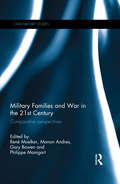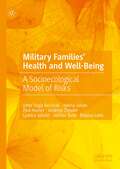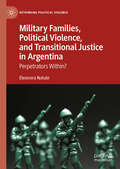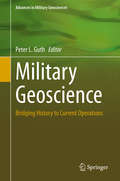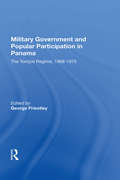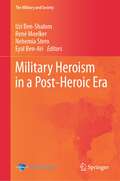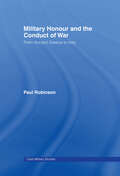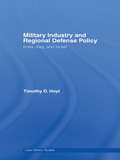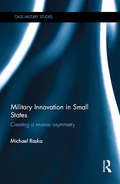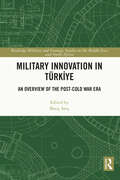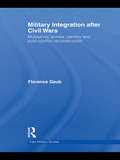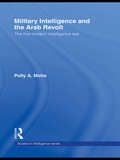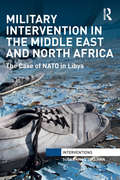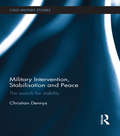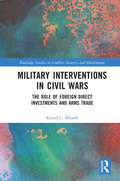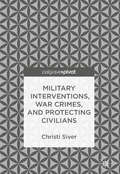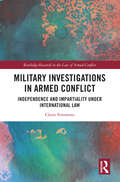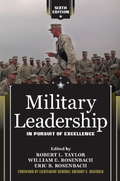- Table View
- List View
Military Families and War in the 21st Century: Comparative perspectives (Cass Military Studies)
by Gary Bowen Philippe Manigart Rene Moelker Manon AndresThis book focuses on the key issues that affect military families when soldiers are deployed overseas, focusing on the support given to military personnel and families before, during and after missions. Today’s postmodern armies are expected to provide social-psychological support both to their personnel in military operations abroad and to their families at home. Since the end of the Cold War and even more so after 9/11, separations between military personnel and their families have become more frequent as there has been a multitude of missions carried out by multinational task forces all over the world. The book focuses on three central questions affecting military families. First, how do changing missions and tasks of the military affect soldiers and families? Second, what is the effect of deployments on the ones left behind? Third, what is the national structure of family support systems and its evolution? The book employs a multidisciplinary approach, with contributions from psychology, sociology, history, anthropology and others. In addition, it covers all the services, Army, Navy/Marines, Air Force, spanning a wide range of countries, including UK, USA, Belgium, Turkey, Australia and Japan. At the same time it takes a multitude of perspectives such as the theoretical, empirical, reflective, life events (narrative) approach, national and the global, and uses approaches from different disciplines and perspectives, combining them to produce a volume that enhances our knowledge and understanding of military families. This book will be of much interest to students of military studies, sociology, war and conflict studies and IR/political science in general.
Military Families' Health and Well-Being: A Socioecological Model of Risks
by Janja Vuga Beršnak Jelena Juvan Živa Humer Andreja Živoder Ljubica Jelušič Alenka Švab Bojana LobeThis book examines military families' well-being and health outcomes by providing a critical theoretical perspective on their position and the risks and challenges affecting them. Authors explore the tension between demands made by two greedy institutions—the military and the family—and how the well-being of families is negotiated between the two. Uniquely, the book employs an integrative approach to observing and analyzing military-specific risk and protective factors for health outcomes of military families on various social-ecological levels, including relationship satisfaction and dissatisfaction, intimate partnership violence, parent-child relationships, child well-being, psychoactive substance abuse, depression, and PTSD. Throughout the chapters, the authors analyze research findings that reveal new health outcomes and present an empirically-tested model of military-specific risk and protective factors.
Military Families, Political Violence, and Transitional Justice in Argentina: Perpetrators Within? (Rethinking Political Violence)
by Eleonora NatalePerpetrators within? provides the first ethnographic account of the experiences of military families of the Argentine dictatorship (1976-83). At the crossover of multiple disciplines, this groundbreaking study brings advancements in the fields of military and conflict studies, Latin American history, transitional justice and ethnographic methods. The military juntas that seized power in Argentina in 1976 waged a brutal 'dirty war' against communism, leading to seven years of authoritarian rule that claimed thousands of lives. The regime suppressed political opposition through kidnapping, torture, and clandestine executions. Although efforts to bring the military to justice began in 1985, legal obstacles delayed prosecutions for over 20 years. It wasn't until 2005 that trials resumed, resulting in the conviction of hundreds of former officers for crimes committed during the dictatorship. Perpetrators within? questions these unique subjects directly. For the first time, the military of the dictatorship are approached as a community of families and comrades (which includes spouses, children and ‘brothers in arms’) better to understand the personal and collective experiences of those linked to the regime's violent past. Based on extensive research with former junior officers –many now imprisoned – their wives and adult children, the book unveils the social and family life of the military of the 1970s, it investigates the everyday unexceptional scenarios of repression, and it describes the long road to justice from the point of view of military families involved in the trials. A vital contribution to understanding the workings of kinship, military power and violence, this book offers a deeper ad original perspective on one of the darkest chapters in Latin American history.
Military Forces in 21st Century Peace Operations: No Job for a Soldier? (Contemporary Security Studies)
by James V. ArbuckleA major new study of the realities of contemporary warfare, which presents a range of fresh insights and is essential reading for all students and professionals engaged in the field. This book clearly shows us that: neither military nor civilian agencies can act effectively alone in resolving modern conflicts joint civil-military efforts are needed, and those efforts must be deliberately planned from the outset of an operation; they cannot be added on as afterthoughts when all else has failed the record of our efforts over nearly a decade and a half since the end of the Cold War demonstrates that we are doing badly at creating civil-military partnerships, and that we are not getting better. James V. Arbuckle shows how these issues are neither structural nor organizational - they are cultural. They involve attitudes, beliefs, perceptions – positive and negative, true and false. The solutions will involve changing attitudes, moving beyond prejudices, replacing competition with cooperation. The principal mechanisms for this will be common civil-military training and education.
Military Foundations of Panamanian Politics
by Robert Harding IIThis is a comprehensive examination of the evolution of the politicization of the Panamanian military and the legacy of this transformation in modern Panamanian politics. It addresses the fundamental role that the Panamanian military played in influencing and molding the modern-day Panamanian political system--structurally, legally, and constitutionally--and chronicles the corporate and political growth of the Panamanian military, filtering its analysis through civil-military theory, to achieve its two primary goals.
Military Geoscience: A Multifaceted Approach to the Study of Warfare (Advances in Military Geosciences)
by Judy Ehlen Aldino BondesanThis volume presents a selection of papers from the 13th International Conference on Military Geosciences (ICMG), held 24-28 June 2019 in Padua, Italy. It covers a wide range of subjects within the confines of military geoscience written by scientists with a variety of different backgrounds from many countries throughout the world. Many of the papers focus on subjects related to Italy and World War I, but additional subject areas include international perspectives in the military geosciences, international security, geospatial intelligence and remote sensing, subterranean and underground warfare, analyses of historical battlefields and fortifications, and military archaeology. The book will be of interest to academics (e.g., military historians, military archaeologists, military geographers and geologists), applied geoscientists (e.g., engineering geologists and geologists working in other areas of applied geology), professional geoscientists, and those with a general interest in military geoscience and history.
Military Geoscience: Bridging History to Current Operations (Advances in Military Geosciences)
by Peter L. GuthThis book is a collection of papers presented at the 11th International Conference of Military Geoscience that was held in 2015. The conference included discussion on a diverse range of geosciences, including military history, military geology, teaching geology from a military prospective, geological influence on the battlefield, and environmental and cultural issues related to management of military lands. Geology and geography have played a significant role in military history, from providing the stone for primitive tools and weapons, to the utilization of terrain in offensive and defensive strategies. Specific to this volume, deserts comprise nearly a third of the Earth’s surface and have been the site of numerous battles where the dust, heat, and a lack of food and water have provided challenges to military leaders and warriors. This book examines the role of deserts in past and modern warfare, the problems and challenges in managing military lands in desert regions, and how desert environmental conditions can impact military equipment and personnel. This proceedings volume should be of interest to scholars, professionals, and those interested in military history, warfare, geology, geography, cultural resources, general science, and military operations.
Military Government And Popular Participation In Panama: The Torrijos Regime, 1968-1975
by George PriestleyThis book examines the first seven years of Omar Torrijos's military government, with particular attention to its efforts to build political institutions appropriate to the dynamics of class relations within Panama and the country's evolving dependency on the United States.
Military Heroism in a Post-Heroic Era (The Military and Society)
by Eyal Ben-Ari René Moelker Uzi Ben-Shalom Nehemia SternThis book explores the variety of forms that individual heroism and sacrifice can take in the context of contemporary military conflicts. It addresses three key questions: How has an enduring ideal of heroism been transformed by the nature of modern warfare? Are we now witnessing the emergence of new forms of exemplary military behavior? And, have new ideals of heroism (and by association, sacrifice or bravery) been added to older forms in the recent past? The book advocates viewing the concept of military heroism as a moral category, in which its theoretical definition and empirical practice reflect those factors that are seen as being vital for society itself. The key theoretical and topical challenges addressed in the respective chapters focus on how ideas of heroism become entwined with issues of individualization (bolstered by the cultural assumptions of neo-Liberalism), the spread of the human rights discourse, and the judicialization, marketization and mediatization of armedforces. The book was written by experts on military studies, including many who are currently active military personnel. It includes contributions from a variety of disciplines, e.g. anthropology, sociology, psychology, and political science.
Military Honour and the Conduct of War: From Ancient Greece to Iraq (Cass Military Studies)
by Paul RobinsonThis study presents the first examination of the influence of ideas of honour on the causes, conduct and ending of wars from Ancient Greece to the present day. Paul Robinson begins with a theoretical examination of the concept of honour, to clearly explain the many contradictions and tensions inherent within honour systems. He then shows how honour has often contradictory and paradoxical effects on the conduct of war and illustrates this through seven case studies: Classical Greece; Ancient Rome; mediaeval Chivalry; Elizabethan England; the American Civil War; the British Empire; and the Western world after World War II (including the Vietnam War and the current conflict in Iraq). Key topics covered include: honour and virtue honour and the causes of war honour as a motivation for fighting honours and rewards death and honour honour and the conduct of war honour and the enemy honour and the ending of wars women and honour This book reveals that the often contradictory behaviour of soldiers during war is a product of the contradictions inherent in the concept of honour.This book will be of great interest to all students of military ethics, military history, politics, international relations, anthropology, sociology, philosophy and the history of ideas.
Military Industry and Regional Defense Policy: India, Iraq and Israel (Cass Military Studies)
by Timothy D. HoytMilitary Industry and Regional Defense Policy re-examines military industrialization in the developing world, focusing on policy-making in producer states and the impact of security perceptions on such policy-making. Timothy D. Hoyt reassesses the role of regional state sub-systems in international relations, and recent historical studies of international technology and arms transfers. Looking at Israel, Iraq and India, the three most powerful regional powers in the Cold War era, he presesnts an expert analysis of the three-sided phenomena of the regional hegemony, the regional competitor and the small over-achiever. This new book breaks away from existing literature on military industries in the developing world, which has focused on their economic and development costs and benefits. These past studies have used primitive methodologies that focus on the production of complete weapons systems - a misleading gauge in a world of growing international defense cooperation. They have also ignored empirical evidence of the impact of local military industrial production on Cold War regional conflict, and of the defence planning and concerns that drove development of indigenous military industries in key regional powers. This new text delivers an incisive new perspective.
Military Innovation in Small States: Creating a Reverse Asymmetry (Cass Military Studies)
by Michael RaskaThis book provides a comprehensive assessment of the global diffusion of the Revolution in Military Affairs (RMA) and its impact on military innovation trajectories in small states. Although the 'Revolution in Military Affairs' (RMA) concept has enjoyed significant academic attention, the varying paths and patterns of military innovation in divergent strategic settings have been overlooked. This book seeks to rectify this gap by addressing the broad puzzle of how the global diffusion of RMA-oriented military innovation – the process of international transmission, communication, and interaction of RMA-related military concepts, organizations, and technologies - has shaped the paths, patterns, and scope of military innovation of selected small states. In a reverse mode, how have selected small states influenced the conceptualization and transmission of the RMA theory, processes, and debate? Using Israel, Singapore and South Korea as case studies, this book argues that RMA-oriented military innovation paths in small states indicate predominantly evolutionary trajectory, albeit with a varying patterns resulting from the confluence of three sets of variables: (1) the level of strategic, organizational, and operational adaptability in responding to shifts in the geostrategic and regional security environment; (2) the ability to identify, anticipate, exploit, and sustain niche military innovation – select conceptual, organizational, and technological innovation intended to enhance the military’s ability to prepare for, fight, and win wars, and (3) strategic culture. While the book represents relevant empirical cases for testing the validity of the RMA diffusion hypotheses, from a policy-oriented perspective, this book argues that these case studies offer lessons learned in coping with the security and defence management challenges posed by military innovation in general. This book will be of much interest for students of military innovation, strategic studies, defence studies, Asian politics, Middle Eastern politics and security studies in general.
Military Innovation in Türkiye: An Overview of the Post-Cold War Era (Routledge Military and Strategic Studies on the Middle East and North Africa)
by Barış AteşThis book explores Turkish military innovation since the Cold War. The major questions addressed are how Türkiye has been able to innovate, the production of new weapon systems, its philosophical background, how the country overcame bureaucratic and economic obstacles, and how these innovations resonated in military doctrine and organization. Focusing on two main defense industry projects that trigger an overall change in the military doctrine and organization, the text examines the innovative inclinations of the Turkish military realm and reveals the societal, economic and political consequences of military innovation. This book fills a gap in the literature by providing an interdisciplinary and comprehensive overview of Turkish military innovation. Contributors include those involved in and affected by the military innovation process, as well as scholars who monitor the process using primary sources. Military Innovation in Türkiye will appeal to academics, politicians and military professionals interested in understanding the evolution of the Turkish military.
Military Integration after Civil Wars: Multiethnic Armies, Identity and Post-Conflict Reconstruction (Cass Military Studies)
by Florence GaubThis book examines the role of multiethnic armies in post-conflict reconstruction, and demonstrates how they can promote peacebuilding efforts. The author challenges the assumption that multiethnic composition leads to weakness of the military, and shows how a multiethnic army is frequently the impetus for peacemaking in multiethnic societies. Three case studies (Nigeria, Lebanon and Bosnia-Herzegovina) determine that rather than external factors, it is the internal structures that make or break the military institution in a socially challenging environment. The book finds that where the political will is present, the multiethnic military can become a symbol of reconciliation and coexistence. Furthermore, it shows that the military as a professional identity can supersede ethnic considerations and thus facilitates cooperation within the armed forces despite a hostile post-conflict setting. In this, the book challenges widespread theories about ethnic identities and puts professional identities on an equal footing with them. The book will be of great interest to students of military studies, ethnic conflict, conflict studies and peacebuilding, and IR in general Florence Gaub is a Researcher and Lecturer at the NATO Defence College in Rome. She holds a PhD in International Politics from Humboldt University, Berlin.
Military Integration during War-to-Peace Transitions: South Sudan’s Attempt to Manage Armed Groups, 2006-13 (Routledge Studies in Peace and Conflict Resolution)
by Lesley Anne WarnerIn the 1960s, only 10% of peace agreements included some element of political-military accommodation – namely, military integration. From Burundi to Bosnia to Zimbabwe, that number had increased to over 50% by the 2000s. However, relatively little is understood about this dimension of power-sharing often utilized during war-to-peace transitions. Through an examination of the case of South Sudan between 2006 and 2013, this book explores why countries undergoing transitions from war to peace decide to integrate armed groups into a statutory security framework. This book details how integration contributed to short-term stability in South Sudan, allowing the government to overcome wartime factionalism and consolidate political-military power prior to the referendum on self-determination in 2011. It also examines how the integration process in South Sudan was flawed by its open-ended nature and lack of coordination with efforts to right-size the military and transform the broader defense sector, and how this led the military to fragment during periods of heightened political competition. Furthermore, the book explains why integration ultimately failed in South Sudan, and identifies the wider lessons that could be applied to current or future war-to-peace transitions. This book will be of great interest to students of war and conflict studies, peacebuilding, post-conflict reconstruction, African security issues, and International Relations in general, as well as to practitioners.
Military Intelligence and the Arab Revolt: The First Modern Intelligence War (Studies in Intelligence)
by Polly A. MohsMilitary Intelligence and the Arab Revolt examines the use and exploitation of intelligence in formulating Britain’s strategy for the Arab Revolt during the First World War. It also presents a radical re-examination of the achievements of T.E. Lawrence (Lawrence of Arabia) as an intelligence officer and guerrilla leader. Modern intelligence techniques such as Sigint, Imint and Humint were incorporated into strategic planning with greater expertise and consistency in Arabia than in any other theatre during the war, and their deployment as tactical support for the Arab forces was decisive. Using much previously unpublished material, this study shows conclusively how Britain’s intelligence community in Arabia influenced the conduct of the Arab campaign, promoted a full-scale guerrilla war and thereby facilitated the Arab armies’ march north into Syria, Palestine and the modern Middle East. Polly A. Mohs contributes to the unveiling of another hidden corner of the history of the Middle East and to a better understanding of the significance of intelligence in formulating strategic processes in the modern era. Military Intelligence and the Arab Revolt will be of much interest to students of intelligence studies, military history, Middle East history, British imperial history, guerrilla warfare and insurgency.
Military Intervention in Pre-War Japanese Politics: Admiral Kato Kanji and the 'Washington System' (Curzon Studies In East Asia Ser.)
by Ian GowThis is a study of the impact of inter-war naval arms control policy-making on the domestic politics of Japan, especially the areas of civil-military, inter-military (Army/Navy) and especially intra-military (Navy) relations and on the professional and political career of one leading naval figure, Admiral Kato Kanji (1873-1939). In this re-appraisal of Kato's career, the author challenges the conventional and negative interpretation of both Kato's role in the naval politics and factions within the Imperial Navy, utilizing Kato's involvement in the domestic political debate as a focal device for studying two key areas of Japanese civil-military relations: civilian control and the phenomenon of massive, overt naval intervention in domestic politics.
Military Intervention in the Middle East and North Africa: The Case of NATO in Libya (Interventions)
by Susannah O'SullivanThis book contributes to an increasingly important branch of critical security studies that combines insights from critical geopolitics and postcolonial critique by making an argument about the geographies of violence and their differential impact in contemporary security practices, including but not limited to military intervention. The book explores military intervention in Libya through the categories of space and time, to provide a robust ethico-political critique of the intervention. Much of the mainstream international relations scholarship on humanitarian intervention frames the ethical, moral and legal debate over intervention in terms of a binary, between human rights and state sovereignty. In response, O’Sullivan questions the ways in which military violence was produced as a rational and reasonable response to the crisis in Libya, outlining and destabilising this false binary between the human and the state. The book offers methodological tools for questioning the violent institutions at the heart of humanitarian intervention and asking how intervention has been produced as a rational response to crisis. Contributing to the ongoing academic conversation in the critical literature on spatiality, militarism and resistance, the book draws upon postcolonial and poststructural approaches to critical security studies, and will be of great interest to scholars and graduates of critical security studies and international relations.
Military Intervention, Stabilisation and Peace: The search for stability (Cass Military Studies)
by Christian DennysThis book examines international military interventions that have supported stability in four communities in Afghanistan and Nepal, in an attempt to analyse their success and improve this in future. This is the first in-depth village-level assessment of how local populations conceive of stability and stabilisation, and provides a theory and model for how stability can be created in communities during and after conflict. The data was collected during field research from 2010-12. In Afghanistan the conflicts examined include the invasion of the Soviet Union in 1979, the civil war from 1992 and the rise and fall of the Taliban. In Nepal the research examined the origins of the Maoist movement and the start of the People’s War in 1996 to its completion in 2006 and the subsequent Madeshi Andolan in 2007. The book argues that international, particularly Western, notions of stability and stabilisation processes have failed to grasp the importance of local political legitimacy formation, which is a vital aspect of contemporary statebuilding of a ‘non-Westphalian’ nature. The interventions, across defence, diplomatic and defence lines, have also at times undermined one another and in some cases contributed to instability. The work argues that the theories that structure interventions to address threats to international stability in ‘fragile’ states are insufficient to explain or achieve the goal of stability. This book will be of interest to students of stabilisation operations, statebuilding, peacebuilding, counterinsurgency, war and conflict studies and security studies in general. Christian Dennys is lecturer at Cranfield University/UK Defence Academy and has a PhD in International Relations.
Military Interventions in Civil Wars: The Role of Foreign Direct Investments and the Arms Trade (Routledge Studies in Conflict, Security and Development)
by Kamil C. KlosekThis book examines the motivations of military interventions in civil wars, with a focus on the role of foreign direct investment (FDI) and the arms trade. The book assumes a state-centric view of international relations, whereby states remain the dominant actors on the world stage. It breaks away from the conventional wisdom that military interventions for economic interests are a product of domestic corporate lobbying and instead argues that states intervene to protect (but not advance) existing corporate investments for national strategic interests. The work introduces new concepts of military interventions – proxy interventions and indirect interventions – which are determined by arms trade relationships between the permanent members of the United Nations Security Council (UNSC) and recipient countries, and utilizes insights from principal-agent theory, whereby the permanent members of the UNSC delegate military interventions in civil wars to other countries. The book concludes by examining the transformative effect of FDI on the willingness of a state to intervene militarily in a civil war, focusing on the case of China in Sub-Saharan Africa. Provided that the current positive trends in FDI and arms trade persist, we are likely to see more and not fewer military interventions in the future. This book will be of much interest to students of civil wars, military interventions, security studies and International Relations.
Military Interventions, War Crimes, and Protecting Civilians
by Christi SiverWar crimes have devastating effects on victims and perpetrators and endanger broader political and military goals. The protection of civilians, one of the most fundamental norms in the laws of war, appears to have weakened despite almost universal international agreement. Using insights from organizational theory, this book seeks to understand the process between military socialization and unit participation in war crimes. How do militaries train their soldiers in the laws of war? How do they enforce compliance with these laws? Drawing on evidence from the Korean War, the Malayan Emergency, and the Canadian peacekeeping mission in Somalia, the author discovers that military efforts to train soldiers about the laws of war are poor and leadership often sent mixed signals about the importance of compliance. However, units that developed subcultures that embraced these laws and had strong leadership were more likely to comply than those with weak discipline or countercultural norms.
Military Investigations in Armed Conflict: Independence and Impartiality under International Law (Routledge Research in the Law of Armed Conflict)
by Claire SimmonsAn allegation is made that a war crime was committed by a soldier during a conflict. Who should investigate the allegation? How should they investigate?This book explores a topic of critical importance in legal and policy discussions surrounding the accountability of military operations in armed conflict, and problematises some presumptions that are often made about the topic. The work provides the international legal framework necessary to address these questions and establishes the precise standards of independence and impartiality as applicable to investigations in armed conflict. It questions the assumption that the standards of independence and impartiality of investigations should be measured in the same way that we measure these standards for judges, courts, and tribunals. It also explores the ways in which military institutions and culture, as well as the context of armed conflict, may impact on the effectiveness of investigations or the perception of justice by those affected. By demonstrating the precise ways in which military investigations can contribute to or hinder the effectiveness of investigations, the book clarifies States’ responsibilities with regard to their accountability efforts for serious violations of international law in armed conflict. The work will be a valuable resource for academics, researchers, and policy-makers working in the areas of international humanitarian law, international human rights law, as well as political science and military ethics.
Military Leadership
by Robert L. Taylor William E. Rosenbach Eric B. RosenbachThe sixth edition of this classic text continues its popular interdisciplinary approach to the topic of leadership by examining fundamental elements of military leadership: the "process" of leadership, the dynamic personal interactions between leader and followers, and the individual and organizational values that foster effective military leadership. Military Leadership provides a thoroughly reconsidered and greatly expanded mix of classic and contemporary articles as well as original essays, with authors representing all of the services. Incisive introductory essays to each section highlight themes and connections. Eric B. Rosenbach joins the editorial team for this edition, helping infuse the text with fresh perspectives. The essays of the sixth edition confront the kudos and criticisms that surround military leadership today, offer international viewpoints, and relate military leadership to contemporary leadership theory and approaches.
Military Leadership
by Robert L. Taylor William E. Rosenbach Eric B. RosenbachThe sixth edition of this classic text continues its popular interdisciplinary approach to the topic of leadership by examining fundamental elements of military leadership: the "process" of leadership, the dynamic personal interactions between leader and followers, and the individual and organizational values that foster effective military leadership. Military Leadership provides a thoroughly reconsidered and greatly expanded mix of classic and contemporary articles as well as original essays, with authors representing all of the services. Incisive introductory essays to each section highlight themes and connections. Eric B. Rosenbach joins the editorial team for this edition, helping infuse the text with fresh perspectives. The essays of the sixth edition confront the kudos and criticisms that surround military leadership today, offer international viewpoints, and relate military leadership to contemporary leadership theory and approaches.
Military Leadership
by Taylor Robert L. Rosenbach William E.The sixth edition of this classic text continues its popular interdisciplinary approach to the topic of leadership by examining fundamental elements of military leadership: the "process" of leadership, the dynamic personal interactions between leader and followers, and the individual and organizational values that foster effective military leadership. Military Leadership provides a thoroughly reconsidered and greatly expanded mix of classic and contemporary articles as well as original essays, with authors representing all of the services. Incisive introductory essays to each section highlight themes and connections. Eric B. Rosenbach joins the editorial team for this edition, helping infuse the text with fresh perspectives. The essays of the sixth edition confront the kudos and criticisms that surround military leadership today, offer international viewpoints, and relate military leadership to contemporary leadership theory and approaches.
